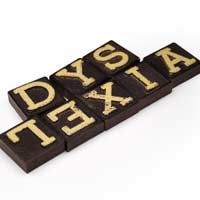How Does Dyslexia Affect A Child's Language Skills?

Dyslexia is a learning disability that causes difficulties when learning to write, read and spell. Although Dyslexia doesn’t affect speech as such, it may limit a child’s understanding and ability to learn new words. As children with dyslexia may have problems with their short term memory, it makes it difficult for them to process and remember information.
What Causes Dyslexia
Dyslexia is not caused by lack of motivation, emotional problems, and lack of education or sensory impairment. Dyslexia is neurobiological or of a genetic origin that creates a weakness in the ability to process language based information. It usually runs in the family and it can affect anyone at any level of intellect. It is believed that dyslexia affects at least 10 per cent of the UK.How Will Dyslexia Affect My Child?
When your child has Dyslexia, you may notice that they can read perfectly well. However, they may struggle with writing, spelling, recognising certain letters, memory and their organisation skills. Dyslexia can cause problems in maths as well as literacy. Some people with dyslexia have problems recalling certain number facts, and may have difficulty with basic arithmetic.How To Spot Dyslexia
You may notice before your child even goes to school that they have problems processing and remembering certain pieces of information. Sometimes, dyslexia isn’t diagnosed until secondary school or until adulthood. As with anything, the sooner it can be spotted the better. This is so teaching methods can be adjusted to suit the child with Dyslexia, and allow them to live a perfectly normal life.Before your child goes to school or nursery, look for the following signs as a possibility of Dyslexia:
- Children naturally have short attention spans; however, a child’s attention span should get better as time goes on. If your child has a short attention span it could be sign of Dyslexia.
- Putting objects and toys into a sequence is a good way to see if your child is progressing well or not. If your child is unable to put things into sequence whether they are numbers, letters, colours or size, it could be a sign of Dyslexia.
It is important to remember that although these are usually good indicators for diagnosing Dyslexia, they are not definite signs. Look out for the following signs when your child is at primary school to see if they may have Dyslexia:
- Children progress at different rates when they go to school. However, if your child is far behind the other children in the same age range, they may have Dyslexia.
- Another sign of Dyslexia is children writing letters and numbers the wrong way round. It is not uncommon for lots of children to do this anyway, but if your child continues to do it well into the school years, it may be a sign of Dyslexia.
- Constant problems with spelling and reading may also be because of Dyslexia.
How Can I Help My Child?
Having Dyslexia doesn’t mean that your child cannot achieve wonderful things. Now that Dyslexia is recognisable, steps can be taken to provide your child with the right kind of teaching and training.You and your child’s teacher need to be patient and outline teaching strategies especially created for children with Dyslexia. It is likely that your child will need extra tuition outside of school as a result of Dyslexia, but this will take away the pressure that they may feel when at school.
Your child’s school will be able to give you a list of books suitable for your child, they should also give you lots of up to date information in how to deal with children that have Dyslexia.
The most important thing to remember is if your child does have Dyslexia, not to lose hope. There are lots of fantastic organisations that will offer advice to you and your child. Even if your child does have Dyslexia, it doesn’t mean they will not go on to lead a full, well-rounded and happy life.
- Games To Help Teach a Child a Second Language
- How to Help Your Children With Phonics at Home
- Popular Methods That Help Your Child To Spell
- Developing Your Child's Speech
- How Reading Can Improve A Child's Language Skills
- The First Step In English - Phonics
- Ways to Enhance Your Child's English Writing


Re: Why English Grammar Is Important
There are a certain parts that werent.... Or There are certain parts that werent...
Re: Understanding Intonation and Stress in Speech
How much for the intonation e-book? Best regards, Lily
Re: English Language: Silent Letters
@Deb - according to the Cambridge Dictionary, it should be pronounced 'wenz.de', which doesn't sound right - I think…
Re: English Language: Silent Letters
I have never known the "d" in Wednesday to not be pronounced - it should be Wed-nes-day - which is from the Germanic Wodan's…
Re: Using English Verbs, Adverbs and Adjectives
i need to know all the adjectives and verbs for my GCSE exam omg i am sick of exams now they are anoying me
Re: Using English Idioms
I found the contents very useful and relevant to my classroom transations.
Re: What You Will Need to Learn English
i love reading your article it help me to understand how important for me to reading english.. i want to learn english…
Re: How to Write Paragraphs
As a teacher teaching English I find your website helpful. Cheers
Re: Ten Tips to Help You Learn English as a Second Language
The biggest mistake Spanish students make is trying to translate word for word. For example;…
Re: English Language: Silent Letters
A longtime since ive been in grammer school.I will be 80 years old my next birthday, This is a very enlightening ,and helpful…